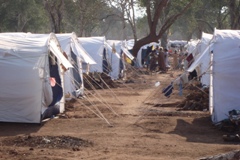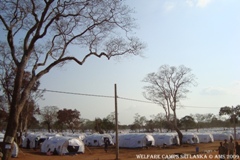Oct 26, 2012 | Views
On the 26th of October 2012, it was the Feast (or Eid ul Adha) symbolizing the culmination of the pilgrimage by Muslims to Mecca (the Hajj). These few days of light and love are supposed to characterise meditation, blessings and prayers for peace.
It also serves as a symbol of unity in diversity as Malcolm X wrote “…we were all participating in the same ritual, displaying a spirit of unity and brotherhood…. I have never before seen sincere and true brotherhood practiced by all colours together, irrespective of their colour.”
Whilst for Muslims worldwide, Eid ul Adha is the second most important holiday in their calendar, for a select few who have the privilege of actually performing the hajj, it is the most spiritual of journeys, answering the invitation from God to visit Makkah, and completing one of the essential pillars of Islam. It is a journey that asks for God’s forgiveness, as the human being is stripped to its core representing the destruction of the inner demons and an equalization with one’s peers.
To read more, please click here
Sep 30, 2012 | Views
For those of us working in the field of intercultural dialogue and understanding, it has been a frustrating few weeks. Just as you think progress is being made between communities, global events peg you back displaying once again the vulnerability of human endeavours in trying to achieve peaceful coexistence and showing the very challenges that need to be overcome in order to ensure that the wheels are kept on the track.
For me this past two weeks has shown two different perspectives on the issue of the Freedom of Speech and how difficult it is to draw acceptable boundaries of such freedoms that people can readily and wholeheartedly agree on.
To read more, please click here
Aug 23, 2012 | Views
The two most repeated words in the English Language are “Never Again”, heard in commemorations of the Holocaust to express the commitment that genocide will never again take place. Yet “Never Again” has also come to symbolise the absolute weakness in the will of the international community to act against genocide. This weakness was exposed in Bosnia and in Rwanda and now it seems that it is being exposed yet again, now in Myanmar with its ethnic Rohingya people, a Muslim minority living in the Arakan region.
As reports of mass killings, mass graves, rape, and torture come out of Myanmar with figures of at least 20,000 Rohingya killed since June 28, it seems that like Rwanda and Bosnia, a group of voiceless people are once again being systematically wiped out. This seems to be sanctioned by their government, under the eyes of the international community. The pictures in circulation (although it is hard to verify their authenticity sometimes) depict the horrific nature and scale of the existing tensions in Myanmar.
Many of the Rohingyas have been forced to flee to Bangladesh by boat with some reportedly travelling for days on end to escape the trauma of the current situation. However, they have been refused entry by the Bangladeshi government which has also suspended aid agencies from working in the camps which harbour Rohingya refugees.
Perhaps what is even more shocking is the complicity of the entire country of Myanmar, from the President down to the grass roots. The President has come on record to tell the UN to “establish refugee camps and allow for the deportation of ethnic Rohingya as the ‘only solution’”, whilst Buddhist monks have backed calls for the extermination of the race of Rohingyas. This statewide support for the killing of “Kalaras”, which is the pejorative slur that has become a popular and casual way of referring to Muslims of South Asian decent – or the Rohingyas – is once again reminiscent of Rwanda which witnessed an exhortation for mass killings over the public airwaves.
For more information, please click here
Aug 21, 2012 | Views
What a difference a year makes. This time last year, London and the rest of the United Kingdom were in a state of shock as riots (and subsequent looting) held the authorities hostage for over a week. Writing on this subject back then, I stressed that what was needed was a collective response from both the government and wider society in dealing with the complex background context that had fermented the riots. I talked about the need to engage with each other and to start the process of ‘linking’ to not only understand each other but to strengthen communities, add to social cohesion and contribute to personal and professional development through friendships made, as well as work undertaken across the partnerships. Linking, partnerships, and engagement all mean the same thing: a sense of cooperation that leads to better understanding that should be encouraged and supported. This is a powerful tool for the promotion of dialogue, tolerance, and harmonious living.
However, since then, despite assurances of addressing some of the real issues, it seems that not much has really been done. Some compensations have been paid out (though it appears not in amounts promised), damaged buildings have been rebuilt and looters have been jailed. But there has been very little done to address some of the underlying factors that precipitated the riots.
To read more, please click here
Aug 10, 2012 | External News
The open-ended Extra-ordinary Executive Committee of the OIC convened at the Permanent Representative level on 5th August 2012 at OIC Headquarters to discuss the critical situation of the Muslim ethnic Rohingya minority under the chairmanship of Mr.Bakhyt Batyrshayev, Permanent Representative of the Republic of Kazakhstan to OIC. After a round of discussions, the Committee;
Proceeding from the principles and objectives of the Charter of the Organization of Islamic Cooperation and pursuant to the resolutions on the question of Muslim Minorities and Communities;
Stressing the need to respect the universally accepted human rights and norms and principles of international humanitarian law;
Condemning the continued disregard of international law by Myanmar and its detrimental implications for regional and global peace, stability and security;
Appreciating the efforts of the OIC Group on Human Rights and Humanitarian Issues in Geneva to highlight the Rohingya issue in line with the Secretary General’s proposals;
Commending highly the efforts of the Secretary General to resolve the issue of the Rohingya minority in Myanmar by convening this extra-ordinary executive committee and his early and timely response to the situation in Arakan particularly by communicating to the UN Secretary General, UN High Commissioner for Human Rights, ASEAN Secretary General, EU High Representative, President of Myanmar and Chairperson of National League for Democracy, and expressing concern to governments in the region particularly with the People’s Republic of China during his recent visit;
Welcoming Catherine Ashton’s statement on July 22, 2012 stating the EU is closely monitoring acts of violence against the Muslim minority in Myanmar and will be dispatching experts from the European Community Humanitarian office (ECHO) to Myanmar to determine the urgent needs of the Muslims. The UN High Commissioner for Human Rights’, Navi Pillay, statement on July 27th, 2012 claiming that Muslim Communities in Arakan State were being targeted by Myanmar security forces and the announcement of sending a special rapporteur to Myanmar. The Visit by Vijay Nambiear, Special Adviser on Myanmar to UN Secretary General, Ban Ki-moon, to Arakan state in Myanmar after the violence erupted.
Having listened to the speech of the OIC Secretary General, the presentation of Dr.Wakar Uddin, Director General of Arakan Rohingya Union (ARU), and to the interventions of Head of Delegations,
1. Condemns in the strongest possible terms the brutal aggression and systematic gross violations of human rights committed by armed gangs and encouraged by the authorities and condemns in particular the involvement of security forces and their instigation in the clashes by the Myanmar authorities and Buddhist against innocent unarmed Muslim civilians;
2. Emphasizes that the atrocities committed against Rohingya minority in Myanmar including killing, razing houses, forced eviction, forced labor in harsh conditions, summary executions, rape, torture have approached the crime of genocide and represent a serious threat to international peace and security and regional stability, as clearly demonstrated by the recent violence. It is a serious crime against humanity, and a blatant breach of international law, which needs to receive proper reaction by the international community through bringing Myanmar authorities who are responsible for these heinous acts to justice;
3. Reiterates its firm and unwavering demand for an immediate halt of the unlawful acts of crimes against humanity perpetrated towards Rohingya in Myanmar and the opening of Myanmar borders to allow for unfettered humanitarian access;
4. Highlights the United Nations Declaration that the “Rohingya are a linguistic, religious, ethnic minority from western Burma”.
5. Calls upon the Myanmar authorities and Rakhine Buddhists to abstain from the use of force and violence and give precedence to peaceful resolutions through dialogue towards national unity.
6. Recommends;
a) Member States to support the United Arab Emirate’s call for a special session of the Human Rights Council and urgently request to file a collective complain to the UNHRC urgently requesting to dispatch a Commission of Inquiry. The council should also ask Myanmar to cooperate fully with the Commission and to take measures to ensure the accountability of all violations of human rights in order to prevent their repetition and continue to monitor the situation.
b) Request the OIC Secretary General and Member States to explore all possible means through engagements with the United Nations including tabling of a Rohingya Muslim specific resolution in the 3rd Committee of the UN General Assembly at the 66th Session of the UNGA.
c) Member States request the OIC Independent Permanent Human Rights Commission (IPHRC) to examine the situation of Rohingya Muslim minority in Myanmar as a priority issue on its agenda requiring immediate attention and action while presenting concrete recommendations to the Council of Foreign Ministers (CFM) towards addressing the issue in an effective manner.
d) Call on all Member States and non-Member States and local and international NGOs to provide Humanitarian assistance to Rohingya Refugees as well as to the internally displaced in Myanmar.
e) OIC Member States to use their diplomatic contacts at the highest level to help alleviate the sufferings of the Muslim population of Arakan.
f) Urges OIC Member States, international organizations, along with Islamic and international civil society organizations to move promptly and provide necessary and urgent humanitarian assistance to the Rohingya people and to assist them in surmounting this grave crisis, in line with the statement issued by the OIC Secretary General in which he appealed to OIC Member States and humanitarian international organizations to do so.
g) Decides to establish an OIC contact group in close coordination with Arakan Rohingya Union composed of all ASEAN Member States who are Member States of the OIC (Brunei, Indonesia, Malaysia) along with a representative of ASEAN Secretary General and OIC Secretary General. The rest of the membership will be decided by consultation between the OIC Secretary General and interested Member States. The group is mandated to consider ways, means, and mechanisms to ensure the halt of human rights violations against Muslim Rohingya in Myanmar and the return of their citizenship rights.
h) Recommend the Secretary General to appoint a special envoy for this important issue.
i) OIC Secretary General to submit his report to the 4th Extra-ordinary Summit on 14-15 August 2012 in Makkah Al-Mukaramah and the 39th CFM for necessary actions.
j) Send a High- level OIC Representative to Myanmar stand-alone and/or with the OIC Contact Group in Naypidaw.
k) Requests the UN Secretary General to intensify UN activities in order to immediately and unconditionally halt the violence against Rohingya Muslims in Myanmar and alleviate their suffering;
l) Requests the OIC Group in Geneva to follow up the request of the United Arab Emirates’ call for a special session of the Human Rights Council and ensure all OIC Member states to play a positive role in adopting all recommendations specifically a Commission of Inquiry;
m) Call upon world leaders to speak out against these crimes against humanity and urge the Myanmar Government to eliminate the discriminatory law and any other discriminatory practices against the Rohingya people.
n) OIC Member States to remain seized on this matter and requests the Secretary General to provide progress reports on the matter.
Aug 1, 2012 | Views
I am a sports fan and love watching the Olympics. It symbolises all the best in the human sporting excellence and dedication and somehow also represents an opportunity to hit a pause button (rightly or wrongly) on world affairs, as for about two weeks much of the world’s focus is on the athletes.
I see the Olympics as a great opportunity to learn and understand from each other, as athletes engage with people from countries they probably would never engage with, and a time for reflection as the Olympic Truce is observed for about 100 days. Finally, it is a time for learning, as you actually discover countries that you have not even heard of. Politics, corporate sponsorship, tickets aside, the Olympics is probably one of the more unifying events around the world.
When the Olympics was awarded to London, I remember the excitement that greeted it, followed by the sudden realisation of reality as the next day, the 7/7 terrorist attacks took place. In the seven years since, the Olympics’ engagement with communities took a back seat in some respects as security took a higher priority.
For the Muslim community in particular, the scrutiny of radicalisation and constant obsession with identity and affiliation has meant that they have been justifying themselves to the British public. This is a shame as many Muslims in London reside close to the main Olympic parks and thus perhaps have not been able to fully participate in the pre-program as they should have with the hope that they can enjoy the social regeneration that is anticipated afterwards.
Please click here to read more

Jun 27, 2012 | Views
After 26 years of war that cost thousands of innocent lives, the defeat of the Liberation Tigers of Tamil Eelam (LTTE) has brought Sri Lanka to a crossroads.
Reconstruction, resettlement and rehabilitation will be the immediate postwar challenges and will have to be expertly handled. Reconstruction of infrastructure will be the easiest and most attractive option for donors, but creating an environment of equity and social justice could be relegated to the bottom of the list. There must be a separate effort to ensure reconciliation between people. Many barriers have been erected between Sri Lanka’s communities and special programmes to build bridges, facilitate interfaith interaction and regain intercommunity trust are urgently required.
This is the role that the Sri Lankan diaspora as a whole will need to play to bring about a reconciliation that combines human values with an understanding of the need to move away from apportioning blame
To read the full article, please click here

Jun 27, 2012 | Views
The recently telecast Channel 4 documentary on ‘Killing Fields of Sri Lanka’ sheds no new light (despite claims to the contrary), in terms of groundbreaking evidence, regarding the incidents related to the end of the war in Sri Lanka. If anything, it will seek to entrench already hardened attitudes and decrease the ever reducing space for dialogue and reconciliation.
From the government’s perspective, it will seek to discredit the documentary as fake as it feeds into the insecurity that it surrounds itself with, of a perception that the west has been influenced by a highly successful pro LTTE lobby. The end result will be the securing of its ‘credibility’ especially as a ‘victim of an external conspiracy’ consequently rallying the people’s sympathy, thereby making any genuine attempt to hold the government accountable for anything fruitless.
On the other side, for the pro LTTE lobby (largely represented by their supporters in the UK, US and Canada) this will be a ‘vindication’ of their claims regarding the Government and its conduct of the war, thereby serving to boost their movement and support whilst ignoring the part that they have played in fund raising and supporting the LTTE (despite the proscription of the LTTE as a terrorist group).
Jun 27, 2012 | Views
This year marks the 10th anniversary of the invasion of Iraq by the United States, Britain and their allies. According to former leaders, U.S. President George W. Bush and British Prime Minister Tony Blair, the coalition mission was, “to disarm Iraq of weapons of mass destruction, to end Saddam Hussein’s support for terrorism, and to free the Iraqi people”. However, the UN Security Council did not agree with the American and British justifications to go to war with Iraq. France, China, Russia and a major part of the International Community didn’t believe that an Iraq reeling from 13 years of sanctions posed an imminent threat to its people or to neighbouring countries.
After the invasion the US and its allies committed a number of catastrophic policy blunders, rendering the promise of democracy, human rights and social and economic development into nothing more than empty rhetoric. Firstly, the policy of “winning hearts and minds” was supplanted by the military strategy of ‘shock and awe’. Second, there was direct military rule instead of handing full sovereignty to the new Iraqi leadership. Furthermore, instead of a prudent policy of restructuring the already viable and effective security and military institutions, the standing network of establishments were destroyed, leaving 140 thousand American troops to do the job of policing 30 million people, with catastrophic results.
To read more, please click here




